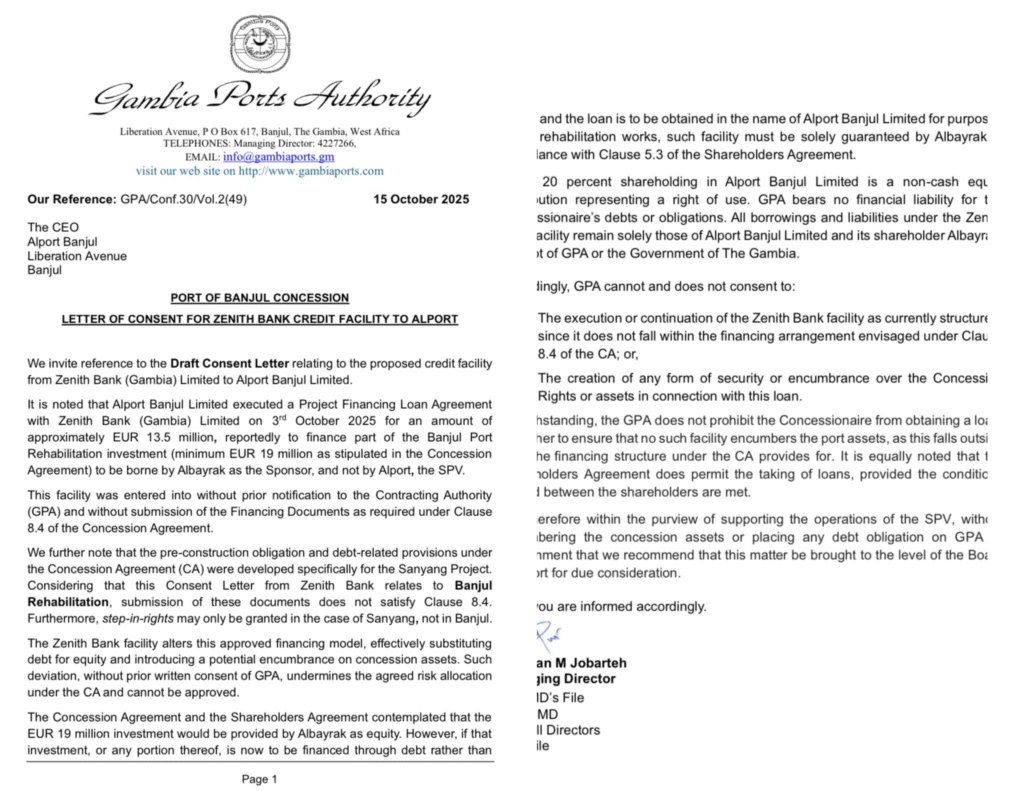
On October 10, I published an article here warning that the so-called “foreign investment” at the Port of Banjul was not what it seemed.
I explained that Albayrak Group, operating through Alport Banjul Ltd, had not brought new Turkish capital, but had instead borrowed Gambian money from Zenith Bank Gambia to finance the project.
Many read it. Some agreed. Others said, “That can’t be true.”
But today, the Gambia Ports Authority (GPA) itself has confirmed everything in black and white.
The GPA Memo — Dated 15 October 2025
Signed by Managing Director Ousman M. Jobarteh, the memo openly states:
• Alport Banjul Ltd executed a €13.5 million loan with Zenith Bank Gambia to fund the port rehabilitation.
• This was done without prior notice to GPA, violating Clause 8.4 of the Concession Agreement.
• The loan “substitutes debt for equity”, meaning the company used borrowed money instead of its own investment.
• GPA refuses consent to any arrangement that puts the port’s assets at risk.
• It stresses that the government’s 20 % share is non-cash, so the public carries no liability for Alport’s debts.
The same concerns I raised on October 10, now confirmed by the authority that manages the port.
So, What Does This Really Mean?
It means that the Port of Banjul, our national gateway, is being upgraded using money from our own banks, not funds brought from abroad.
It means the private operator is earning in dalasis, repatriating profits in euros/dollars etc, and borrowing from the same financial pool that Gambian businesses depend on.
This means that even “foreign investment” can quietly become local debt if nobody is watching.
And finally, it means the GPA did its duty by sounding the alarm.
Vindication Is Not Victory
Yes, this memo vindicates what we said.
But this is not about being right, it’s about being responsible.
The memo is only the first crack in the wall of silence.
Now, each institution must play its role, because the stakes are national.
What Each Institution Must Do
- GPA — You’ve spoken up; now go further.
Publish the entire signed Concession Agreement and Shareholders Agreement that you referenced.
Let Gambians read the confirmed Clause 8.4 and Clause 5.3 for themselves.
Transparency is not treason, it’s trust.
2. National Assembly (FPAC & PEC)
Summon the parties—demand full disclosure from the Ministry of Finance, GPA, and Albayrak.
If the people’s port can be tied to a private loan, the people’s representatives must investigate.
3. Ministry of Finance (MoFEA)
Clarify whether any government guarantee or comfort letter was issued.
Was the State, directly or indirectly, pledged in this transaction?
4. Central Bank of The Gambia (CBG) —
Explain whether this €13.5 million loan complies with prudential limits.
If a single facility can crowd out local credit or drain foreign reserves, CBG must safeguard the system.
5. Albayrak Group / Alport Banjul
Show good faith. Release your complete financing plan and loan terms.
If this project truly benefits The Gambia, prove it by being transparent.
For the Citizens
Understanding these issues isn’t about accounting, it’s about ownership.
Every bag of rice, every bag of fertilizers, every imported medicine passes through that port.
If that gateway is mortgaged, our independence becomes paperwork.
So let’s keep asking, calmly but firmly:
“Whose money built this port, and who will own it when the 30 years are up?”
Final Word
My publication was a wake up call and The GPA’s memo vindicated it.
It shows that accountability is possible, if we care enough to read, ask, and speak.
Let’s not wait another generation to realize we financed our own captivity.
Let’s insist that national deals be done in the light of day, not the shadows of debt.
Because patriotism today means understanding the contract, not just waving the flag.
Finally,this isn’t about opposition or government for or against. It’s about the next chapter for The Gambia. As the presidency contemplates 2026 and beyond, remember: the strength of a leader is not just in winning votes, but in protecting what belongs to the people.
When you say, “I vote for transparency,” you mean: no hidden loans, no unaccounted guarantees, no foreign profit over Gambian asset.
Let’s keep asking: Is our port deal building independence, or locking us in?
Because the answer will shape not only the presidency, but our nation’s next thirty years.
By Jallow Modou
Financial & Economic Analyst | Washington D.C, USA



